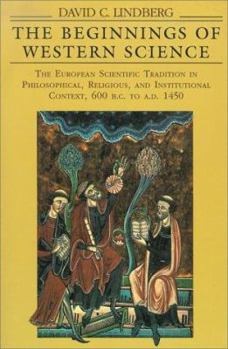The Beginnings of Western Science: The European Scientific Tradition in Philosophical, Religious, and Institutional Context, 600 B.C. to A.D. 1450
Select Format
Select Condition 
Book Overview
This landmark book represents the first attempt in two decades to survey the science of the ancient world, the first attempt in four decades to write a comprehensive history of medieval science, and the first attempt ever to present a full, unified account of both ancient and medieval science in a single volume. In The Beginnings of Western Science, David C. Lindberg provides a rich chronicle of the development of scientific ideas, practices,...
Format:Paperback
Language:English
ISBN:0226482316
ISBN13:9780226482316
Release Date:July 1992
Publisher:University of Chicago Press
Length:474 Pages
Weight:1.44 lbs.
Dimensions:1.2" x 6.0" x 9.0"
Customer Reviews
5 ratings
First Rate Survey
Published by Thriftbooks.com User , 15 years ago
This is a first rate survey of Western science from the Classical period to the eve of the Scientific Revolution. Arranged chronologically, Lindberg summarizes an immense amount of scholarly literature in a very well written text. Lindberg makes a consistent and successful effort to avoid anachronistically looking back at developments of the point of view the emergence of modern science. History of science is presented here with a strong effort to situate it in the context of contemporary intellectual and general history. Lindberg deals also with some historiographic issues related to prior interpretations of history of science. This is all quite difficult to do in a survey book and Lindberg carries this off very, very well. Each chronological period has a discussion of major developments and enough general history to make the context intelligible. Topics of greatest significance, such as Aristotle's system or Medieval physics, get excellent coverage. Some persistent themes are the importance of the Aristotelian system, the interaction between Platonic and Aristotelian ideas, the complex interaction between the Classical heritage and Christianity, the particular importance of the Islamic world as the heir and transmitter of Classical knowledge, and the importance of mathematical concepts. Lindberg does very well as showing the achievements of Classical and Medieval science while discussing why its underlying assumptions were different from the modern science that emerges in the 17th century. The footnotes and bibliography are excellent and constructed with an eye to providing a good guide into the literature for interested readers. This book is a real nice combination of informed scholarship and pedagogy.
The Begiinings ofWestern Science: The European....
Published by Thriftbooks.com User , 16 years ago
I have read a number of publications by David Lindberg starting with his dissertation at U. Chicago. This book, like his other publications, is well wrttten, understandable and useful. I recommend this book to the scientific audience as a fine resource for us all. It brings together a great scholarly exposition of the history of modern science, which in large measure has European origins.
Clearly the best ancient/medieval science text that exists!
Published by Thriftbooks.com User , 23 years ago
I read the Beginnings of Western Sceince as a student at the University of Wisconsin-Madison where I had the extreme priviledge of taking two history of science courses from the author, who is also an absolutely outstanding professor. (And also one of the two or three most knowledgeable people in the world in the history of medieval science) This is by far the most comprehensive text on the history of ancient and medieval science that is out there. You might not believe it, but there aren't even a lot of other texts that cover half of what is discussed here period, let alone any that are this polished and concise. This book not only covers the development of western science from ancient times throught the Middle Ages, but it also considers the religious, and philosophical roots of this development. This book is masterfully written in that it provides a tremendous amount of detail, and yet is accessible to anyone that is an educated and interested reader. I cannot recommend this text highly enough.Also Recommended: The Structure of Scientific Revolutions by Thomas KuhnIn his book The Structure of Scientific Revolutions, Thomas Kuhn discusses the importance of history and its relationship to science, the changing views of how historians view past scientific achievements, the role of scientific method in science, and the nature and foundations of scientific revolutions.
A great book by a great professor
Published by Thriftbooks.com User , 24 years ago
I had to read this book because I'm currently taking a history of science class taught by the author at the University of Wisconsin, Madison, and I just want to say it's excellent. It is clear, concise and (best of all from a student's point of view) not boring. It teaches you so much about looking at things in context. This is a great book from a great professor.
Lively dinner conversation with an expert.
Published by Thriftbooks.com User , 24 years ago
I have read many, many histories of science, but this is far and away the best I have read.





